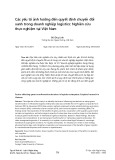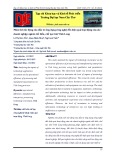
1
Chapter 10: Case Study in
Financial Modeling and
Simulation of a Forestry
Investment
Investment in forestry as an
example of capital budgeting
techniques applied to long
term projects.

2
Introduction
Forestry provides two types of long
term benefits:-
Wood benefits;
timber, poles, thinnings
Non-Wood benefits;
environmental protection,
wildlife habitat,
land restoration,
recreational environment.
Both these benefits can span a lifetime
of over 50 years.

3
Cash Flow Structure
General for Projects Particular to Forestry
initial cash outlay long term maintenance
inflows from sale of product timed on-going outlays:-
thinnings, maintenance,
income- poles or timber?
income – time of harvest?
Cash Flow Forecasting
Cash flow prediction over a long horizon is difficult.
Investment Evaluation Criteria
The Land Expectation Value(LEV) model is applied
in preference to the NPV model.

4
Key Parameters in Forestry
Models
Establishment:- land, land preparation,
plant stock, planting, watering.
Maintenance:- weed control, fertilizing,
pruning and thinning, fire and pest
protection.
Inflows:-
wood; commercial thinning, final harvest
non-wood; flora gathering, recreation,
land renewal.
Required rate of return.

5
Forest Yield Factors
Wood growth is measured by the
MAI: Mean Annual Increment;
‘the annual increase in cubic meters of
harvestable timber per hectare’.
The MAI is influenced by-
relevant rainfall, soil fertility,
species mixture, planting régime,
crop protection.
Final monetary payoff is influenced by-
harvest age, species type, timber price.





![Bài giảng Môi trường kinh doanh quốc tế [chuẩn SEO]](https://cdn.tailieu.vn/images/document/thumbnail/2013/20130817/insert_12/135x160/8021376706890.jpg)
![Lời Cảnh Báo: [Thêm thông tin cụ thể để tối ưu SEO]](https://cdn.tailieu.vn/images/document/thumbnail/2013/20130731/phuongmychi/135x160/1751057323.jpg)



















